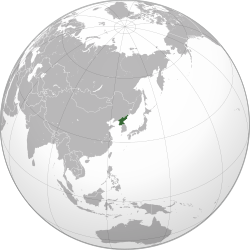North Korea
From Wikipedia, the free encyclopedia
North Korea, officially the Democratic People's Republic of Korea (DPRK) (Chosongul: 조선민주주의인민공화국), is a country in East Asia, occupying the northern half of the Korean Peninsula. Its capital and largest city is Pyongyang. The Korean Demilitarized Zone serves as the buffer zone between North Korea and South Korea. The Amnok River and the Tumen River form the border between North Korea and People's Republic of China. A section of the Tumen River in the extreme north-east is the border with Russia.
The peninsula was governed by the Korean Empire until it was annexed by Japan following the Russo-Japanese War of 1905. It was divided into Soviet and American occupied zones in 1945, following the end of World War II. North Korea refused to participate in a United Nations–supervised election held in the south in 1948, which led to the creation of separate Korean governments for the two occupation zones. Both North and South Korea claimed sovereignty over the peninsula as a whole, which led to the Korean War of 1950. A 1953 armistice ended the fighting; however, the two countries are officially still at war with each other, as a peace treaty was never signed.[9] Both states were accepted into the United Nations in 1991.[10] On May 26, 2009, North Korea unilaterally withdrew from the armistice.[11][12]
North Korea is a single-party state under a united front led by the Korean Workers' Party (KWP).[13][14][15][16] The country's government follows the Juche ideology of self-reliance, developed by the country's former President, Kim Il-Sung. After his death, Kim Il-Sung was declared to be the country's Eternal President. Juche became the official state ideology when the country adopted a new constitution in 1972,[17] though Kim Il-sung had been using it to form policy since at least as early as 1955.[18] Officially a socialist republic,[19][20] many media organizations outside North Korea report that it is a totalitarian Stalinist dictatorship.[14][15][21][22][23] The current secretary of the KWP Central Committee Secretariat and leader of the armed forces is Kim Jong-il, son of Kim Il-sung.




Tidak ada komentar:
Posting Komentar